Whether you’re a business owner or property manager in the City of Chico, we work with you to tailor recycling, organics, and landfill programs based on your needs.
Learn more about recycling in Chico here.

MIXED ORGANICS
For materials such as food scraps (fruit and vegetable peels, leftovers), yard waste (grass clippings, leaves), and paper products (napkins, paper towels). These materials are collected for composting where they break down to create nutrient-rich soil.
Available in 64 or 96-gallon cans as well as 1.5, 2, and 3YD bins serviced weekly or multiple times per week for commercial or multi-family dwellings.
| Green Waste | Frequency | |||||||
| 1x/wk | 2x/wk | 3x/wk | ||||||
| 64 | Gallons | $43.27 | $86.51 | $129.78 | ||||
| 96 | Gallons | $61.82 | $123.64 | $185.44 | ||||
| 2 | Yards | $179.80 | $359.59 | $539.40 | ||||
| 3 | Yards | $260.80 | $521.58 | $782.34 | ||||

MIXED RECYCLABLES
Paper, cardboard, glass, plastics, and metals are collected in the mixed recyclables containers. After collection, these materials make their way through a Materials Recovery Facility (MRF), where they are sorted and baled to become a new viable resource.
Available in 64 or 96-gallon cans as well as 1.5, 2, 3, 4, 6, and 8YD bins serviced weekly or multiple times per week for commercial or multi-family dwellings.
| Mixed Recyclables (one cart free) |
Frequency | |||||||
| 1x/wk | 2x/wk | 3x/wk | 4x/wk | 5x/wk | 6x/wk | |||
| 96 | Gallons | FREE | $29.86 | $59.72 | $89.58 | $119.44 | $149.30 | |
| 1.5 | Yards | $73.82 | $147.60 | $221.42 | $295.22 | $369.03 | $442.82 | |
| 2 | Yards | $93.78 | $187.55 | $281.33 | $375.08 | $468.86 | $562.63 | |
| 3 | Yards | $133.74 | $267.44 | $401.16 | $534.90 | $668.61 | $802.34 | |
| 4 | Yards | $173.67 | $347.33 | $520.99 | $694.66 | $868.33 | $1,042.00 | |
| 6 | Yards | $253.55 | $507.10 | $760.65 | $1,014.20 | $1,267.76 | $1,521.27 | |
| 8 | Yards | $333.44 | $666.86 | $1,000.30 | $1,333.73 | $1,667.17 | $2,000.58 | |

LANDFILL
Materials that are not recyclable such as film plastics, styrofoam, wax-lined paper, soiled materials, and other waste that cannot be recycled or composted. These materials are collected and sent to a landfill facility for disposal, where they are managed according to environmental regulations.
Available in 32, 64, and 96-gallon cans, as well as 1.5, 2, 3, 4, 6, and 8YD bins serviced weekly or multiple times per week for commercial or multi-family dwellings.
| Landfill Container (by volume) |
Frequency | |||||||
| 1x/wk | 2x/wk | 3x/wk | 4x/wk | 5x/wk | 6x/wk | |||
| 32 | Gallons | $21.97 | $43.93 | $65.92 | $87.88 | $109.84 | $131.83 | |
| 64 | Gallons | $32.95 | $65.89 | $98.85 | $131.79 | $164.75 | $197.69 | |
| 96 | Gallons | $46.43 | $92.84 | $139.31 | $185.73 | $232.14 | $278.56 | |
| 1.5 | Yards | $92.27 | $184.50 | $276.77 | $369.02 | $461.29 | $553.52 | |
| 2 | Yards | $117.23 | $234.44 | $351.66 | $468.85 | $586.07 | $703.29 | |
| 3 | Yards | $167.17 | $334.30 | $501.45 | $668.62 | $835.76 | $1,002.92 | |
| 4 | Yards | $217.09 | $434.16 | $651.24 | $868.33 | $1,085.41 | $1,302.50 | |
| 6 | Yards | $316.94 | $633.87 | $950.81 | $1,267.75 | $1,584.70 | $1,901.59 | |
| 8 | Yards | $416.80 | $833.57 | $1,250.38 | $1,667.16 | $2,083.96 | $2,500.72 | |
WASTE SORTING GUIDE
-
Organics
Recycle
Landfill
Drain all sauces and liquids from your organics and place them loosely inside the container. If you feel the need to bag your organics, please use uncoated paper bags, as we do not accept plastic or “compostable” bags in the organics bin.
Food Scraps
- Bread, grains, and pasta
- Cheese & yogurt
- Coffee grounds with paper filter
- Eggshells
- Fruit (pits & peels)
- Leftovers and spoiled food
- Meat (including bones)
- Seafood (including shellfish)
- Tea and tea bags
- Vegetables
Food Soiled Paper
- Coffee filters
- Greasy pizza boxes
- Paper plates
- Paper bags, napkins, tissues, and towels
- Paper take-out boxes and containers
- Tissues
Plants
- Branches and brush
- Flowers and floral trimmings
- Grasses and weeds
- Leaves
- Small tree trimmings
Other
- Cotton balls and cotton swabs
- Dryer lint
- Hair, fur, and non-synthetic feathers
- Natural corks
- Sawdust
- Small, clean, untreated lumber
- Vegetable wood crates
- Wooden chopsticks
Unacceptable Materials
- ANY plastic
- Aluminum foil or trays
- Cat litter or animal feces
- Ceramic dishware or glassware
- Clothing, linens, and rags
- Cooking oil
- Diapers
- Dirt, rocks, or stone
- Flower pots or trays
- Foil-backed or plastic-backed paper
- Glass, metal, or plastics
- Liquids or ice
- Paper milk, juice, and other beverage cartons
- Plywood, pressboard, painted or stained wood
- Recyclable or clean cardboard or paper
- Styrofoam
Recycling must be loose, free of a plastic bag liner. Recycling must be clean and dry. Give food and beverage containers a light rinse.
Metal
- Aluminum cans
- Aluminum foil and trays
- Caps and lids from bottles, jars, and steel (tin) cans
- Paint cans (must be empty or dry)
- Spray cans (must be empty)
- Steel (tin) cans
Plastics
- Bottles (leave caps on)
- Buckets (metal handle ok)
- CDs, DVDs, CDROM & Cases (remove paper insert)
- Coffee cup lids
- Containers and clamshells
- Laundry detergent bottles
- Molded plastic packaging
- Tubs and lids
Unsoiled Paper
- Bags (paper only)
- Cardboard (non-waxed)
- Cereal boxes and Paperboard (remove plastic liner)
- Computer and office paper
- Egg cartons (paper)
- Envelopes (windows okay)
- Junk mail and magazines
- Newspapers
- Packing or Kraft paper
- Phone books
- Sticky notes
- Shredded paper (place in paper bag)
- Wrapping paper (non-metallic)
Glass
- Glass bottles and jars only
(metal caps and lids too)
Unacceptable Materials
- Batteries
- Ceramic dishware or glassware
- Coat hangers
- Clothing and Fabric (we suggest donating to a shelter or thrift store)
- Electronics
- Food scraps
- Glass mirrors and windows
- Light bulbs and HIDs
- Plastic items mixed fabric or rubber
- Scrap metal
- Soiled paper (paper plates, napkins, tissues, towels, take-out boxes, and greasy pizza boxes)
- Styrofoam
- Waxed cardboard
- Wood
- Yard trimmings
Landfill Materials
- Cat litter and animal feces (bagged)
- Ceramic dishware or glassware
- Cigarette Butts (put out – run under water prior to disposal)
- Coat hangers
- Dental floss
- Diapers
- Feminine Hygiene Products
- Glass mirrors and windows inside a double brown paper bag and smashed in small pieces
- Waxed cardboard and paper
- Waxy paper milk or juice cartons
Landfill Materials
- Mylar (shiny metal) bags (potato chips, candy bars, balloons, etc)
- Pens and pencils
- Plastic items mixed with metal or rubber
- Rubber bands
- Six-pack ring holder – please cut up
- Sponges
- Styrofoam
- Twist ties
- Wood – small pieces of plywood, pressboard, and painted or stained wood
Unacceptable Materials
- Appliances
- Asbestos
- Batteries
- C&D Debris
- Cooking oil and grease
- Dirt, rocks, or stone
- Electronics
- Fluorescent or HID light bulbs
- Food scraps, soiled paper, or yard trimmings
- Household hazardous waste or chemicals
- Large items (furniture, metal, plastic, wood)
- Liquids or ice
- Motor oil
- Needles or syringes
- Paint
- Recyclable cardboard, glass, metal, paper, or plastic
- Toys with electronics or batterie
CART & BIN DIMENSIONS*
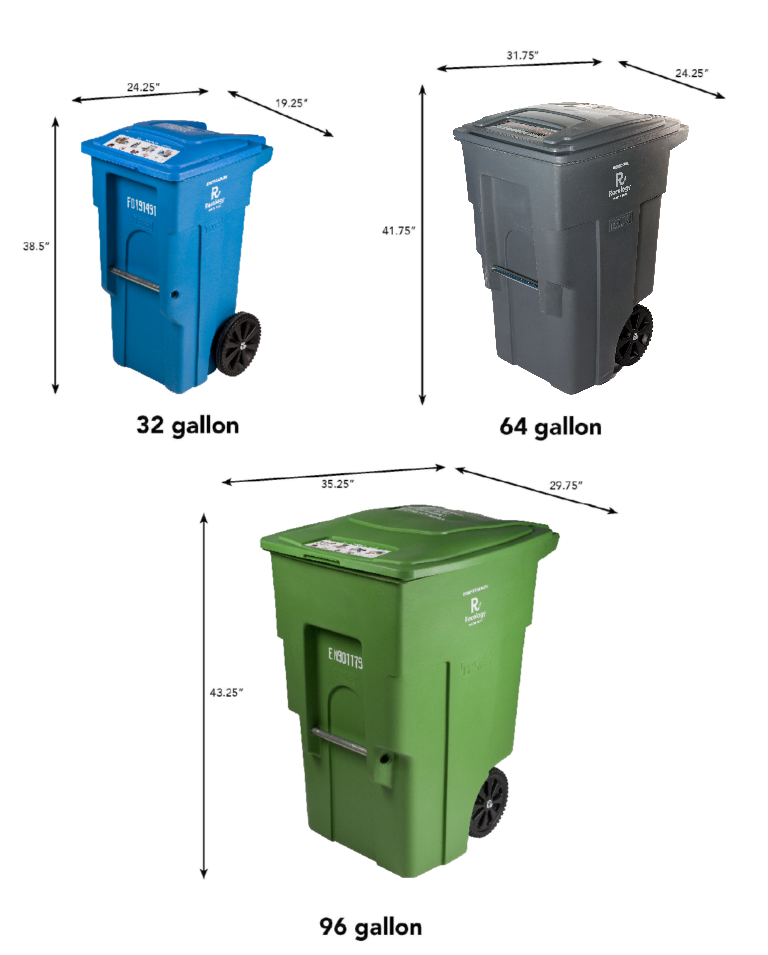
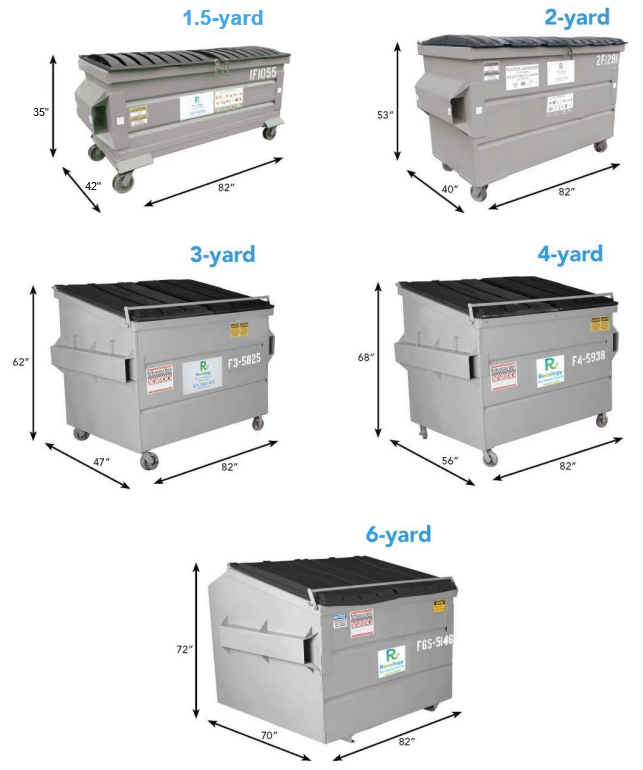
- * Dimensions are approximate, pictures not to scale
Contact us for more information on rates and containers.
BEST DISPOSAL PRACTICES
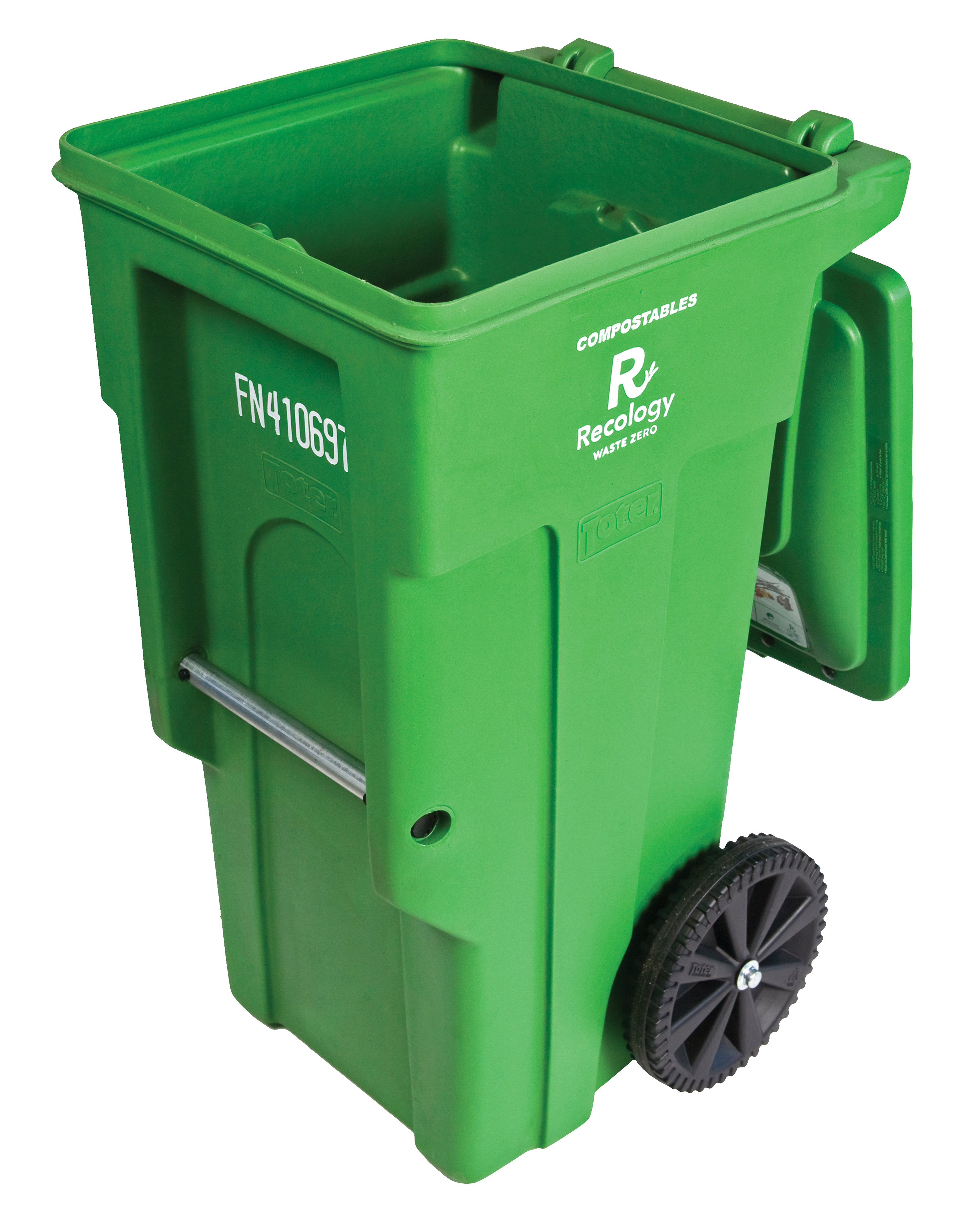
Mixed Organics
-
-
-
- Place all organic materials loosely inside the organic container. If you feel the need to bag your organics, please use uncoated paper bags
- We do not accept plastic or “compostable” bags in the organic containers.
- Drain all sauces and liquids from your organics.
- Include paper towels, napkins, paper plates, and pizza boxes (make sure to dispose of any plastic in the garbage).
- If you have a kitchen pail, put all food scraps from your pans and plates into it. Use it to transport materials to the organics container.
-
-
For more information on what belongs in your organics cart, view your sorting guide.
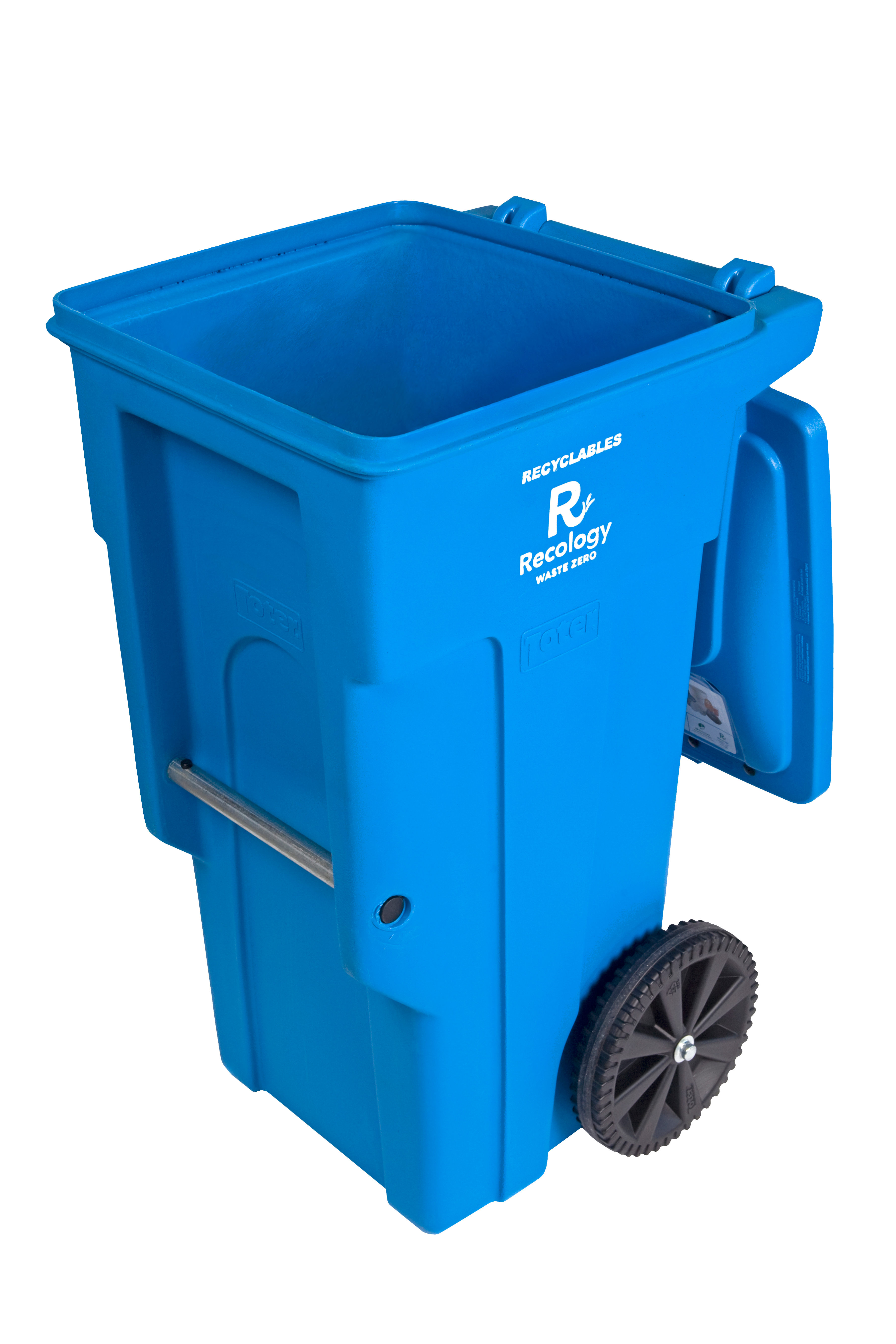
Mixed Recyclables
-
-
-
- Remove any plastic coverings, metal staples, paper clips from paper.
- Shred confidential documents before recycling.
- Place paper directly into the recycling can, avoid bagging any recyclables.
- Empty, clean, and dry all plastics.
- Flatten large plastic bottles/cans to save space.
- Break down all cardboard boxes and remove packing materials like styrofoam or plastic liners.
-
-
For more information on what belongs in your recycle cart, view your sorting guide.
CONTAINER PLACEMENT & STORAGE
-
-
-
- Recycling, organics, and landfill containers are collected by a semi-automated sanitation truck. The automated truck requires ample room to collect containers safely and effectively.
- Place containers on the curb facing the street by 6 AM on collection day (includes some holidays).
- Space containers at least 3 feet from other containers, parked vehicles, or other obstructions without blocking driveways or other public right-of-way.
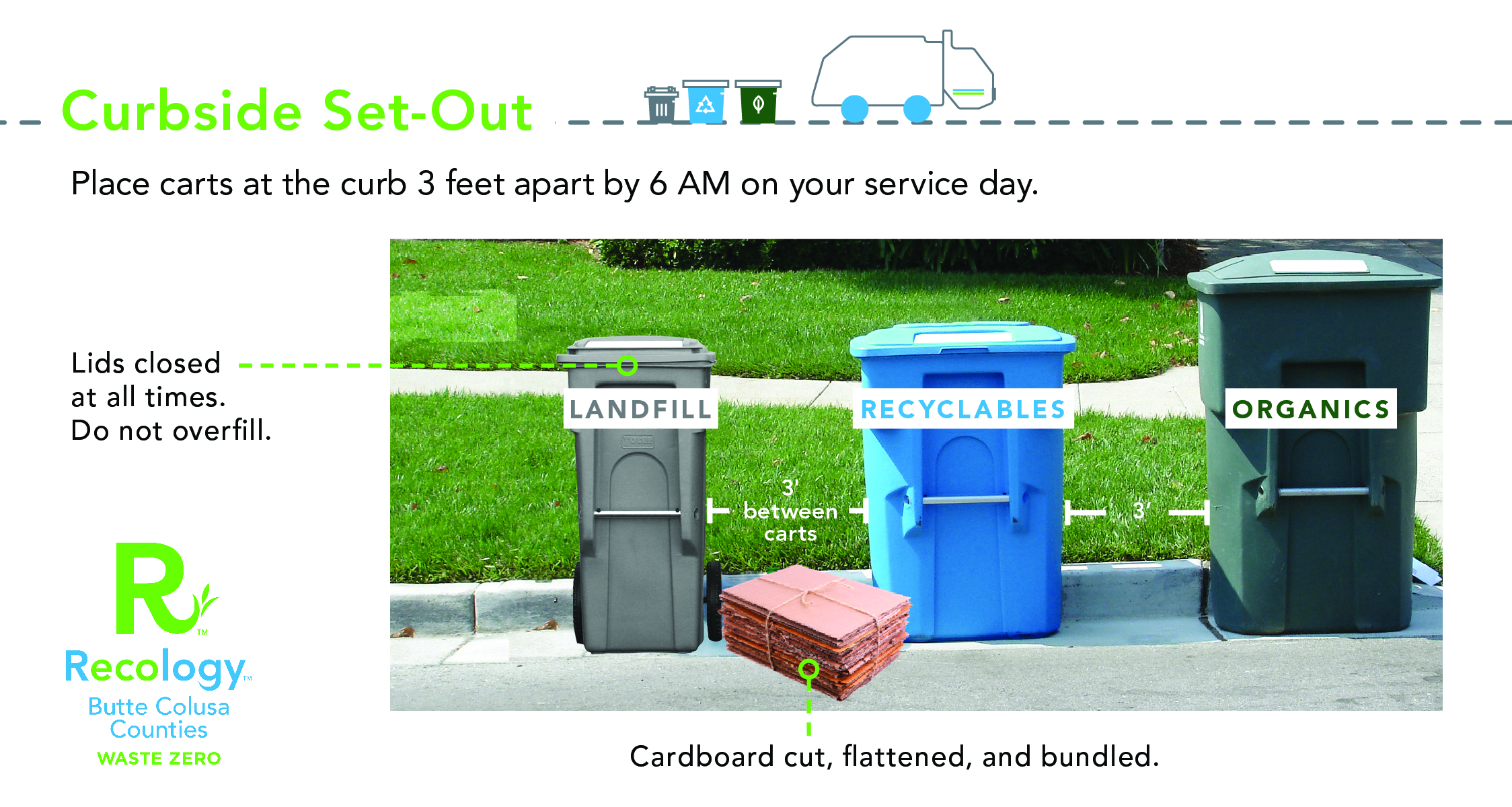
-
-
TIPS TO REDUCE ODORS
-
-
- Baking soda, apple cider vinegar, salt, and lime or lemon juice are commonly used household items to decrease insects and odors.
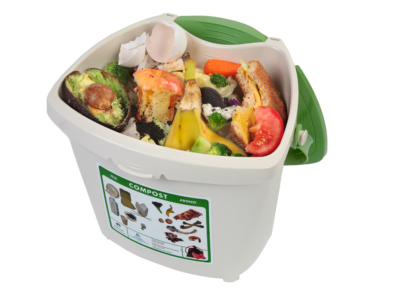
- You can utilize these items by spraying the top of your cart or container with vinegar or lime/lemon juice and sprinkling salt or baking soda to help dry up insects.
- Store your organics container in a cool, shady spot when possible. Keeping the containers cool makes them less attractive to pests, and keeping the lids closed helps contain odors.
- Freeze your food scraps in a paper bag and dispose of it the night before your service day.
- Line the bottom of your organics container with newspaper, food-soiled paper, or yard waste (grass, leaves, sticks, flowers, plants).
- Rinse your organics container with diluted vinegar and let it air dry when you’re ready to clean it.
- Use lime or lemon and baking soda to scrub odors away.
- Baking soda, apple cider vinegar, salt, and lime or lemon juice are commonly used household items to decrease insects and odors.
-
-
DROP OFF
-
-